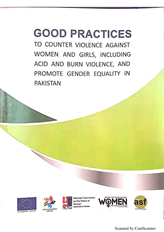GBV Countering VAW
Gender-Based Violence (GBV) is a global issue to which Pakistan is not immune. It is intergenerational and mostly affects women and children (non-binary children and girls in particular) and knows no social, economic, cultural or geographical boundary. It is largely (but not exclusively) perpetuated by men.
GBV can be emotional, physical, sexual or economic and is usually experienced via poly-victimization patterns (when several forms of abuses occur at the same time, or successively, but on the same person). GBV is fueled by several factors such as socio-economic inequalities, harmful traditions and practices relying on toxic masculinity, discriminatory and patriarchal interpretation of religions, inadequate prevention and support services/strategies, poor public health, weak rule of law, lack of awareness, natural and men-made disasters, ill or non-addressed violence during childhood and teenage and other structural barriers.
Within the realm of GBV, Violence Against Women (VAW) and Violence Against Children (VAC) are highly prevalent and linked to each other. Group Development Pakistan (GDP) works on ending GBV and insists on acknowledging the difference between the agency of adults and children. GDP believes that by focusing on tailor-made and holistic methods to end VAW, children will be less vulnerable to violence and exploitation: the safer the women, the safer the children. Moreover, GDP insists on the need to design children-specific interventions to end VAC, which take into consideration a) the difference between an adult and a minor b) children’s increased vulnerability to discrimination, violence and exploitation.
The section below describes how GDP has worked with various stakeholders to promote gender equality, and counter VAW and VAC.
- Please click on the link below to read the report on Good Practices to Counter VAWG in Pakistan.

